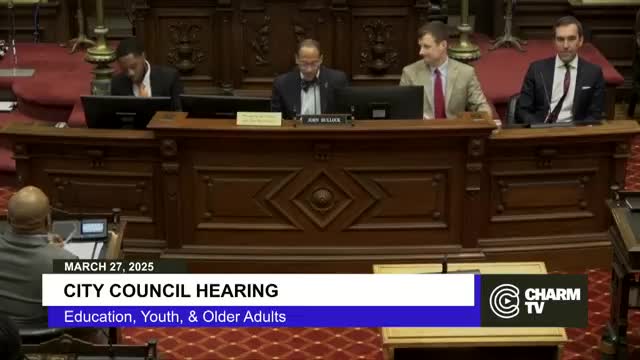Baltimore Children and Youth Fund details spending, capacity-building and $8 million summer investment
Get AI-powered insights, summaries, and transcripts
Subscribe
Summary
The Education, Youth and Older Adults Committee convened on a legislative oversight hearing for L0250014, the Baltimore City Children and Youth Fund (BCYF), where BCYF leaders outlined operations, compliance gains and new spending announced the same day to support summer programs.
The Education, Youth and Older Adults Committee convened on a legislative oversight hearing for L0250014, the Baltimore City Children and Youth Fund (BCYF), where BCYF leaders outlined operations, compliance gains and new spending announced the same day to support summer programs.
BCYF President and CEO Alicia Lee told the committee the fund is “guided by our vision for more justice, abundance, and creativity in Baltimore,” and reported a clean independent FY23 audit, higher grantee compliance and an expansion of capacity-building services for grassroots organizations.
Why it matters: Council members and administration officials said summer programming and job access for young people are urgent priorities. Council members pressed BCYF on how new spending will align with city agencies and on ensuring smaller, Black- and Brown-led grassroots groups can access City Schools funding and federal grant pools.
BCYF presentation and announced allocations BCYF reported it has awarded roughly $32 million since 2020, supports more than 100 organizations and funds programs that together provide more than 17,000 “youth seats” across the city. Lee said the fund’s FY23 audit, completed Nov. 13, 2024, gave a clean opinion with no findings of noncompliance or material weakness. Hannah Machover, BCYF director of grantmaking for compliance, described a disbursement system tied to submitted documentation and said batch disbursements launched July 1, 2024, have put most grantees on predictable payment schedules.
At the hearing the administration and BCYF announced new investments intended to support summer services. JD Merrill, interim deputy mayor for Equity, Health and Human Services, said BCYF would contribute $500,000 toward a City Schools youth sports initiative, $6,000,000 to support the city’s YouthWorks summer jobs program, and $1,500,000 to the mayor’s summer youth engagement strategy. BCYF staff described those allocations as commitments to partnerships that will expand access to athletics, employment and outreach during the summer months.
Capacity building, compliance and grant models BCYF leaders emphasized a dual-investment model: a roughly 75% share of grant dollars for direct grants and 25% for technical assistance and capacity building. Sheree Miller, co-director of grantmaking for portfolio, said the fund has increased grantee compliance from about 30% to over 90% year-to-date after launching broad capacity-building supports, including a six‑month Learning Lab and hundreds of hours of technical assistance. A University of Maryland evaluation of the Learning Lab reported high participant satisfaction and skill gains, BCYF said.
BCYF described multiple grant tracks: a grassroots fund (five-year awards of $50,000 annually for organizations with budgets under $350,000), a community accountable fund, an aligned grantmaking track and a president’s fund (both by invitation). BCYF staff said the same application and due-diligence procedures apply across tracks; the invitation-only tracks limit the applicant pool but follow internal review and compliance checks.
Council concerns and questions from members Several council members welcomed the investments but pressed BCYF on equity and alignment with city priorities. Councilman James Torrance raised concerns that small, Black-led grassroots organizations still lack access to City Schools funding because they miss prequalification or evaluation thresholds (described in the hearing as “SR levels”), and that capacity-building support from City Schools has been limited. Torrance asked for City Schools commitments to expand access to federal funding streams for those small providers.
Council President Z Cohen and Vice Chair Mark Parker both emphasized two themes: the need for shared planning on the fiscal year 2026 budget and the importance of broad stakeholder participation as BCYF expands partnerships with city agencies. Several council members asked for documentation and more granular budget information on the newly announced $8 million in commitments; BCYF asked to follow up with finance staff for detailed line-item sources.
Board composition, youth participation and governance Committee members and BCYF staff discussed board recruitment and the requirement that a portion of the board seats be filled by youth. BCYF said it will launch recruitment for four youth board members with onboarding planned by June; the organization described preparations including anti-adultism training for adult board members. Board chair Larry C. Simmons and staff said board openings are publicly announced and that the organization aims to assemble a mix of skills and lived experience rather than fixed quotas.
Grantee experiences and community testimony More than a dozen grantee leaders and program directors testified in support of BCYF’s funding and capacity-building work, describing technical-assistance classes, learning trips (including a New Orleans convening) and operational supports that helped organizations stabilize and expand services. Speakers included Dr. Renee Tinguellah (Peaceful Warriors), Angelo Solera (Nuestra Raices), Danielle Brown (Cody’s Cave) and others who described program-level impacts and urged continued investment.
Fusion Partnerships and grantee transitions Committee members asked about organizations that previously used fiscal sponsors or intermediaries. BCYF acknowledged a small group of grantees affiliated with Fusion Partnerships—which has since dissolved—and said staff are preparing individualized transition plans to maintain compliance and continuity. BCYF said it will consider temporary flexibility for organizations changing fiscal status while they complete the transition.
Open items and next steps Council members requested: detailed budget sourcing for the $8 million in announced investments; copies of the FY23 audit and the BCYF community needs assessment; and clearer timelines for the youth master plan BCYF plans to convene. BCYF said it will provide requested documents and collaborate with the council, mayor’s office and other partners as it develops a citywide youth master plan intended to be youth‑centered and to take roughly 18–24 months to complete.
Ending BCYF leaders asked for continued council partnership on oversight and planning. The committee scheduled follow-up conversations and asked BCYF and the mayor’s finance staff to return with more detailed fiscal information and documentation about the announced summer investments.
